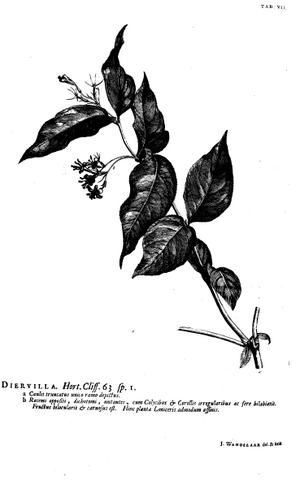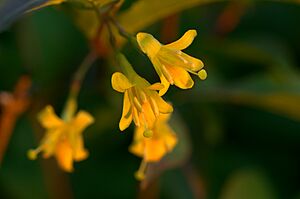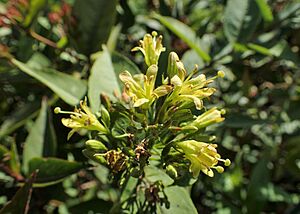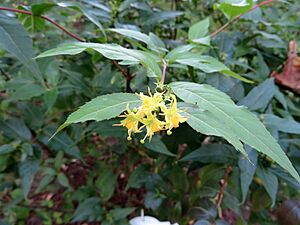Bush honeysuckle facts for kids
Quick facts for kids Bush honeysuckle |
|
|---|---|
 |
|
| Scientific classification |
|
| Kingdom: | Plantae |
| Clade: | Tracheophytes |
| Clade: | Angiosperms |
| Clade: | Eudicots |
| Clade: | Asterids |
| Order: | Dipsacales |
| Family: | Caprifoliaceae |
| Subfamily: | Diervilloideae |
| Genus: | Diervilla Tourn. ex Mill. |
| Species | |
|
See text |
|
Diervilla, also known as bush honeysuckle, is a group of three types of deciduous shrubs. These plants lose their leaves every year. They belong to the Caprifoliaceae family and are all native to eastern North America. The name Diervilla comes from a French surgeon, Dr. Marin Diereville. He brought this plant to Europe around the year 1700.
Bush honeysuckles are usually short, growing about 1 to 2 meters (3 to 6 feet) tall. They spread out to form groups of plants called colonies. They do this using underground stems called rhizomes. Their leaves are simple and grow opposite each other on the stem. They can be oval or pointed with a slightly jagged edge. In the fall, their leaves turn pretty colors like yellow, orange, and red. Small, tube-shaped flowers, usually pale yellow, bloom in June and July.
Contents
Kinds of Bush Honeysuckle
There are three main types of Diervilla plants. Each one has its own common name and grows in different parts of North America.
- Northern bush honeysuckle (Diervilla lonicera)
This type is also called low bush honeysuckle or dwarf bush honeysuckle. It grows from northern Quebec and Labrador all the way south to Georgia and Alabama. It can also be found as far west as Saskatchewan.
- Mountain bush honeysuckle (Diervilla rivularis)
You might also hear this one called Georgia bush honeysuckle. It grows in Alabama, Georgia, and Tennessee.
- Southern bush honeysuckle (Diervilla sessilifolia)
This type is found in the Great Smoky Mountains and the southern Appalachian Mountains.
What Else Looks Like It?
Sometimes, bush honeysuckles are confused with other plants. For example, some plants that used to be called Diervilla are now in a different group called Weigela. Also, bush honeysuckles are often mistaken for common wild honeysuckle (Lonicera tatarica) or Japanese honeysuckle (Lonicera japonica). These are part of a related group called Lonicera.
Where to See Them
The United Kingdom has a special collection of Diervilla plants. You can find it at the Sheffield Botanical Gardens. They also have a collection of the related Weigela plants there.
Bush Honeysuckle and Insects
Diervilla plants are important food sources for the young forms (called larvae) of some Lepidoptera species. Lepidoptera are a group of insects that includes butterflies and moths. For example, the common emerald moth and the engrailed moth larvae eat bush honeysuckle leaves.
See also
 In Spanish: Diervilla para niños
In Spanish: Diervilla para niños
 | Stephanie Wilson |
 | Charles Bolden |
 | Ronald McNair |
 | Frederick D. Gregory |




